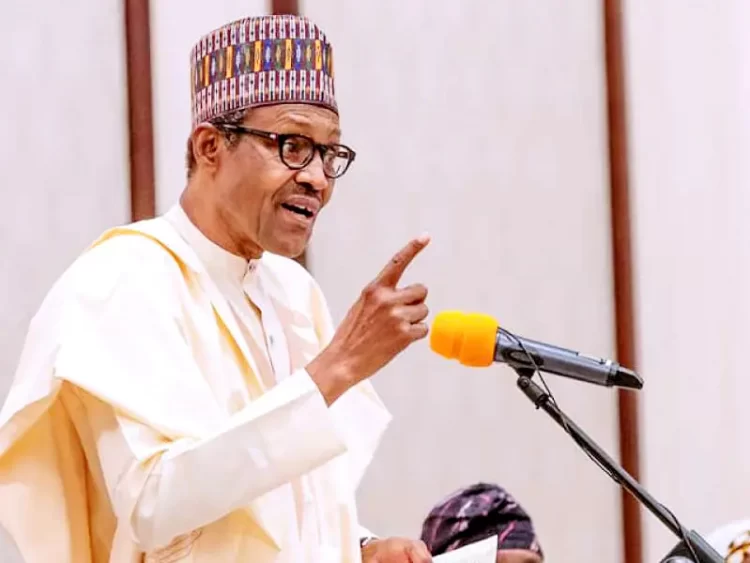President Muhammadu Buhari on Tuesday, described the unreconciled Academic Staff Union of Universities, ASUU, strike as actions based on flimsy reasons, saying that they are undermining the government’s investments in the educational sector.
Buhari stated this at the 4th National Summit on diminishing corruption in the public sector, with the theme: “Corruption and the Education Sector,” organised by the Independent Corrupt Practices and Other Related Offences Commission, ICPC, in collaboration with the Office of the Secretary to the Government of the Federation, OSGF and the Joint Admissions and Matriculation Board, JAMB, with support from MacArthur Foundation in Abuja.
According to him, the incessant strikes by unions in tertiary education could show that the government may be underfunding the education sector, but Buhari clarified that this was not the case.
He said, “Incessant strikes, especially by unions in the tertiary education, often imply that government is grossly underfunding education, but I must say that corruption in the education system from basic level to the tertiary level has been undermining our investment in the sector and those who go on prolonged strikes on flimsy reasons are no less complicit.”
This was even as he decried the increasing rate of sexual harassment in schools, condemning sex for grades, cash for marks/grades, sex for marks, sex for grade alterations and examination malpractices.
He said, “Sexual harassment has assumed an alarming proportion. Other forms of corruption include pay-roll padding or ghost workers, lecturers taking up full-time appointments in more than one academic institution, including private institutions, lecturers writing seminar papers, projects and dissertations for students for a fee, and admission racketeering, to mention only the most glaring corrupt practices.
“I am happy to note that ICPC is investigating and prosecuting sexual harassment as an abuse of power in our educational institutions. I approve and encourage them to continue to do so.”
Buhari further noted that the allocation to education in the federal budget should not be considered via allocation to the Federal Ministry of Education and also academic institutions alone, but should include an allocation to the Universal Basic Education, transfers to TETFUND and refund from the Education Tax Pool Account to TETFUND.
He said, “The 1999 Constitution places a premium on education by placing it on the Concurrent List, thereby laying the responsibilities of budgeting and underwriting qualitative education on both the Federal and State Governments.
“The total education budget for each year is, therefore, a reflection of both federal and state budgets and should be viewed with other financial commitments in their totality.
“I am aware that the aggregate education budget in all the 36 states of the Federation and that of the Federal Government, combined with the internally generated revenues of the educational institutions themselves are also a subject that requires the attention of critics of government funding of education.”
To this end, he assured that government will continue to fund education within realistically available revenue but that “stakeholders, including the media, should equally advocate for transparency in the amount generated as internally generated revenue by educational institutions and how such funds are expended.”
We’ve recovered N1bn diversion of tax from January – October — ICPC Chair
The ICPC Chairman, Prof. Bolaji Owasanoye, SAN disclosed that investigations on the diversion of tax and other statutory revenues have resulted in the recovery of N1 billion from January – October this year by the Commission.
He said, “In support of government’s effort to improve revenue generation the Commission continues to investigate the diversion of tax and other statutory revenues as part of the routine investigation and has recovered N1.264b this fiscal year.”
Owasanoye further disclosed that Politically Exposed Persons, PEPs, inserted soft projects worth over N7 billion for a catchment population of about one million people in the name of empowerment were investigated.
On sexual harassment in schools, he said the Commission has constituted a special team on investigation and prosecution of sexual harassment cases in secondary and tertiary institutions.
He said, “In response to the recent epidemic of sexual harassment in the education sector ICPC has constituted a special team on investigation and prosecution of sexual harassment in secondary and tertiary institutions.
“In collaboration with civil society, we are in the process of introducing a model policy on sexual harassment for academic institutions to adopt. We have also secured some major convictions including that of a professor.”
How we can deal with corruption in public and education sectors — Jega
Delivering his keynote address on “Corruption and the Education Sector,” former Chairman of the Independent Electoral Commission, INEC, Prof. Attahiru Jega, has said for Nigeria to overcome corruption in the public and education sectors, a culture of whistleblowing to expose corrupt practices must be imbibed.
He said, “A culture of whistleblowing to expose corrupt practices and their perpetrators, should be encouraged and nurtured, with appropriate incentives to, and protection for whistleblowers.
“Corruption in the education sector cannot be solved in isolation. Strategies for its resolution would necessarily have to be in the context of a comprehensive grand strategy for addressing corruption in the wider public sector.
“Secondly, active citizenry demanding quality education for their children is an important requirement for making the education sector accountable,” he maintained.


